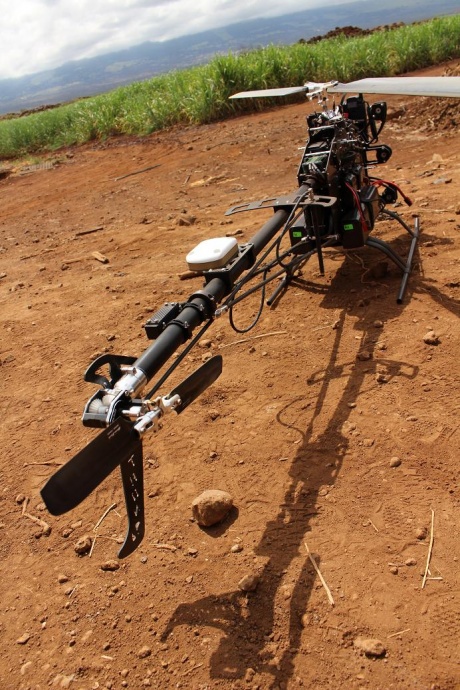Hawaiʻi Selected by FAA for Testing of Unmanned Aircraft Systems

Unmanned Aerial Vehicle to be used to improve irrigation practices and crop yield at HC&S. The HC&S UAV was permitted by the FAA, but is not associated with the FAA research announced today. File photo by Wendy Osher.
By Wendy Osher
Hawaiʻi has been identified by the Federal Aviation Administration as a test site range location for unmanned aircraft systems research.
The FAA today announced the selection of six research test site operators in the country after completing a 10-month selection process that reportedly involved 25 proposals from 24 states.
The Hawaiʻi test site was included in a proposal submitted by the University of Alaska, which contained diverse “climatic zones” and “geographic diversity.”
In addition to Hawaiʻi, the University of Alaska proposal also included test site range locations in Oregon.
The Federal Aviation Administration considered “geography, climate, location of ground infrastructure, research needs, airspace use, safety, aviation experience and risk,” when selecting the six operator proposals.
“Today’s announcement by the FAA is an important milestone on the path toward unlocking the potential of unmanned aircraft,” said Michael Toscano, president & CEO of the Association for Unmanned Vehicle Systems International, in a press release today.
“From advancing scientific research and responding to natural disasters to locating missing persons and helping to fight wildfires, UAS can save time, save money, and, most importantly, save lives,” Toscano said.
According to economic reports detailed by the AUVSI, expansion of UAS technology is projected to create more than 100,000 jobs nationwide, and generate more than $82 billion in economic impact in the first decade following integration.
In addition to the University of Alaska, other test site operators selected by the FAA include the State of Nevada, New York’s Griffiss International Airport, North Dakota Department of Commerce, Texas A&M University – Corpus Christi, and Virginia Polytechnic Institute and State University.
According to the FAA, “test site operators must comply with federal, state, and other laws protecting an individual’s right to privacy, have publicly available privacy policies and a written plan for data use and retention, and conduct an annual review of privacy practices that allows for public comment.”
Under current law, test site operations will continue until at least Feb. 13, 2017, the FAA announced.
Earlier this year, Maui’s Hawaiian Commercial & Sugar Company held a test run of an Unmanned Aerial Vehicle or UAV, that it plans to use to improve irrigation practices at the company’s sugar cane fields.
The HC&S UAV was permitted by the FAA, but is not associated with the FAA research announced today.





_1768613517521.webp)






